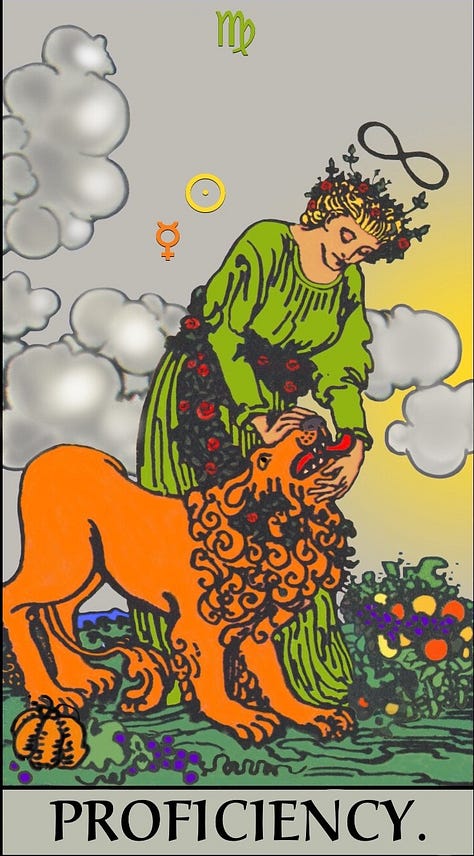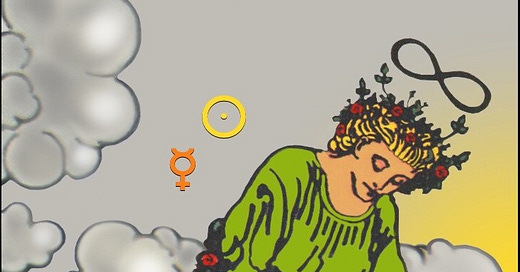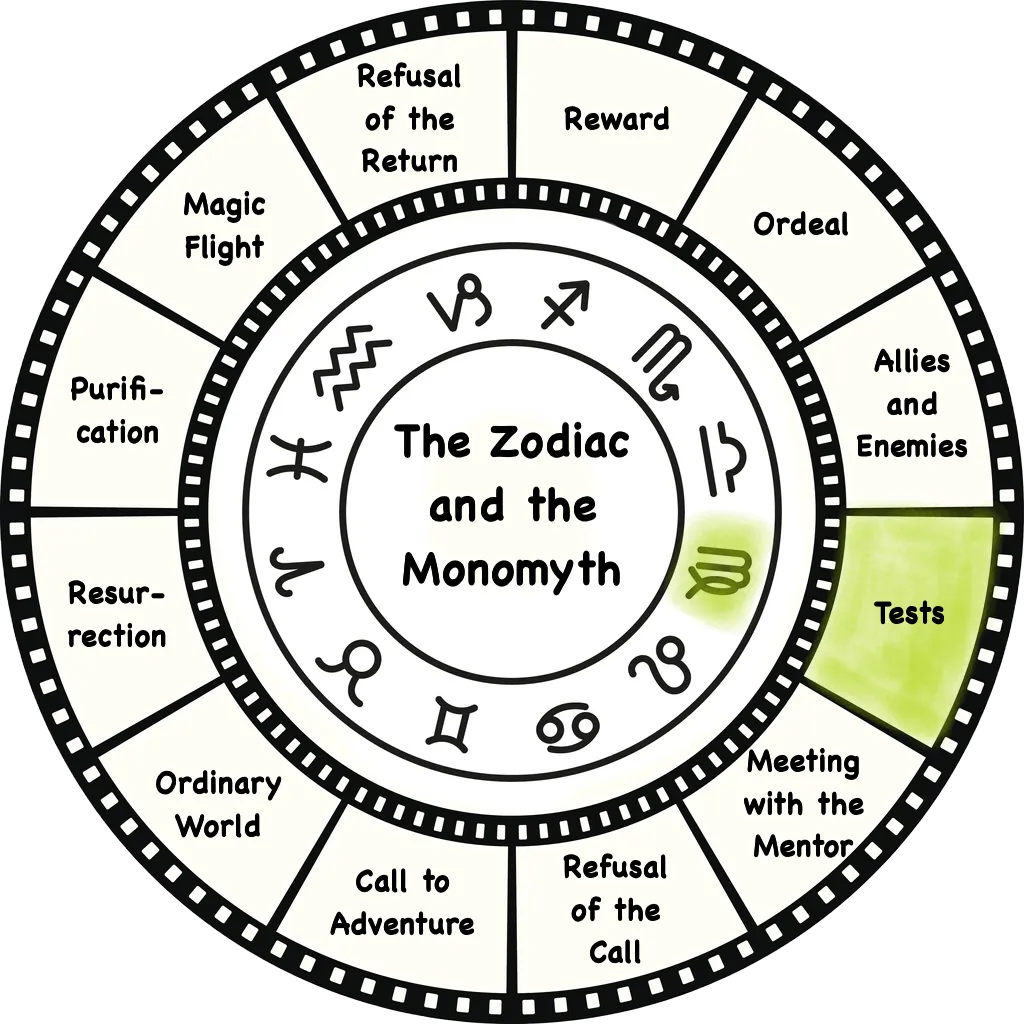Quest for the Elixir: The Satisfaction of Service
Trials and Tests, Virgo, and Proficiency (Strength)
Quest for the Elixir
This post is part of an ongoing series. If you’re new to it, you’ll want to read the introduction first (about 6 minutes):



Three Articles About a Chapter of the Universal Story
Each edition of Quest for the Elixir consists of three articles about one of the 12 chapters in the cyclical Universal Story.
The first article is an exploration of the chapter from the perspective of the Hero’s Journey in Joseph Campbell’s monomyth.
The second article is a view of the same chapter in terms of the Zodiac sign corresponding to it in the cycle.
The third article is about the meaning of the chapter as symbolized in a Major Arcana card of the tarot.
During the month of the Sun’s transit through Virgo, we observe the chapter of The Satisfaction of Service in the Universal Story. In celebration, I offer the following three articles:
The Monomyth: Trials and Tests
Fortified with the advice and encouragement of the previous stage, the hero is ready at last to answer the Call to Adventure that earlier he had refused. Bravely he now crosses the Threshold into the Special World, and his adventure begins in earnest.
Joseph Campbell calls the pathway the hero now walks “The Road of Trials”. Christopher Vogler says that on it the hero encounters “Tests, Allies and Enemies”. In my view, the journey on this ‘road’ consists of two legs: first, the one where practical proficiency is tested, then the one where allies are clearly distinguished from enemies. This article is about the Trials and Tests on the first leg.
The hero being new to the Special World, he proceeds to observe the area around him and learn its rules. Soon he finds opportunities to become acquainted with some of its inhabitants, and situations that challenge his problem-solving skills. In fiction and movies, these events often happen in some public place such as a bar (Rick’s Cafe in Casablanca, the cantina in Star Wars, saloons in various westerns, etc.). The tests prove how well the hero can use what he knows to make his way in the Special World as a capable and helpful member of it.
The real-world counterpart of Crossing the Threshold into the Special World is the young person’s graduation out of adolescence into adulthood, and the first leg of his Road of Trials is his experience in the world of work. Campbell stresses the importance of genuine interest in the service one performs.
“I think the person who takes a job in order to live - that is to say, for the money [not for purpose or passion]- has turned himself into a slave.” ― Joseph Campbell
“You can get a lot of work done if you stay with it and are excited and it’s play instead of work.” ― Joseph Campbell, The Hero's Journey: Joseph Campbell on His Life & Work
Useful service worthy of pay is seriously expected in the world of work, and it’s “sink or swim” for the rookie worker. Does he really have the skills he needs to support himself as a full-fledged adult? This is where he finds out. Once he’s functioning, he can continue to hone his skills to the best of his capabilities.
In our running example of the monomyth, The Wizard of Oz, the stage of Trials and Tests is simple and straightforward. Dorothy’s “Road of Trials” is the famous Yellow Brick Road which Glinda, her mentor, has advised her to follow. Her meetings with the characters who pose challenges to her skills take place not in a bar, but right there along the road.
Each of the characters on the Yellow Brick Road is a personification of one of the Four Elements of Life, which Dorothy now needs to examine and put in working order in her own nature. Dorothy herself expresses the Earth element by her definite intention to return to the soil of Kansas.
The Air element (thinking function) appears as the Scarecrow who is stuck hanging on a pole without a brain. Dorothy’s task is to recognize his plight and help him by freeing him from the pole (open his mind so that he can exercise his thinking). Then she can continue on the road with an open, active mind.
Dorothy Meets the Scarecrow
The Water element (feeling function) appears as the Tin Man, who has rusted stiff from the rain while chopping down a tree, and who doesn’t have a heart. Dorothy’s job is to care what he’s trying to say and oil his joints (help him to relax and express his feelings freely). Then she can continue on the road with hope of a truly loving heart.
Dorothy Meets the Tin Man
The Fire element (intuition function) appears as the Cowardly Lion, who is supposed to be “King of the Forest” and desperately wishes to be, but who lacks the requisite courage. Dorothy’s challenge with the Lion is to grasp intuitively that he doesn’t realize how much courage he really has, and help him to find it. She and the others call the Lion’s power forth (at least temporarily) by celebrating it, as Glinda and the Munchkins did so recently for her. With that, Dorothy’s own courage is strengthened somewhat, and thanks to her help, all four of her elements are functioning as they go “off to see the Wizard”.
Dorothy Meets the Cowardly Lion
If I Were King of the Forest
Virgo
The three Earth signs in the Zodiac reflect the fundamental stages of growth and decay in the vegetation cycle on earth and the ways we treat our resources in order to maintain physical life. Capricorn reflects consolidation of life potential in seed over the winter, Taurus reflects floral fertility and growth in springtime, and Virgo reflects the ripe fruit and start of harvest in late summer.
As harvest time is the time of meticulous gathering and appropriate processing of the fruits of the earth, so the characteristics of Virgo are those of the careful worker. Virgo is all about good health and proper, efficient function of physical bodies, equipment, and systems in general. The way to achieve that is to understand in detail how each system works, maintain it well, and apply appropriate adjustments or remedies as may be needed. That’s being helpful, which is always Virgo’s basic intent.
The style of Virgo is healthy, clean, neat, orderly, appropriate to the occasion, and preferably simple. Some may consider it to be boring. What good are embellishments or frills, Virgo reasons, if someone is unhealthy, something doesn’t work right, or you’re just trying to get some task done? To Virgo, malfunction is offensive and purity is beautiful.
Virgo’s discriminating, critical attitude is not necessarily understood or appreciated for its helpful intent, and that can sometimes be Virgo’s own fault. Context really matters. The instinct to be helpful by correcting or pointing out observed flaws could cause offense in the wrong situation, which would be a worse mistake than the one that prompted it.
"Criticism can be effective when there is something that must be destroyed or dissolved, but it is capable only of harm when there is something to be built." — Carl Jung
In an astrological chart, houses represent the various ‘departments’ of life, and the places where they function. The natural house of Virgo is the 6th house, located in the right part of the wheel as shown above. That’s the house of health and service, and the sign on its cusp in a natal chart describes the way we attend to our health and practical tasks in general, and the kind of jobs we do for pay.
6th-house people are people paid to serve us in any way, professional or otherwise. The category also includes any pet animals we may keep. A 6th-house place is anyplace where some kind of actual work is being done, which can be anything from a factory or repair shop to a business or doctor’s office. The style and typical purpose of one’s most frequent visits to a workplace is something else to which the sign on the natal 6th cusp gives a clue.
In the language of astrology, planets function as ‘nouns’ or ‘verbs’ that represent or express the various energies of life. Each sign reflects the qualities of the planet which rules it. While Saturn is the only planet with an actual earth-structuring function, it rules only one of the Earth signs: Capricorn. The other two Earth signs are ruled by Airy planets that lend their mental energies to earth for adaptation to the seasonal changes. Charming, alluring Venus rules Taurus, and careful, efficient Mercury rules Virgo.
Mercury is the “left-brained” Airy planet of logical thinking. As a ‘verb’, Mercury’s basic functions are to notice details, make connections among a variety of factors, and sometimes apply acquired knowledge to tasks. In an astrological chart, Mercury suggests someone reading, writing, talking, running errands, and/or busy among the details of a job.
Like Venus, Mercury is said to rule two of the signs. Both signs involve knowledge and details. As ruler of Airy Gemini, Mercury functions as a learner, a gatherer and sharer of general knowledge. As ruler of Earthy Virgo, Mercury applies knowledge to skillful performance of detailed work.
While positive Mercury is a force for knowledge and skills to accomplish needed work in the world, like all planets it has a negative side. Negative Mercury is clever but annoying. It tends to be shallow, inappropriately inquisitive and given to unproductive or even destructive mischief (idle gossip, clever ways of cheating, etc.), or overly critical and nit picky, constantly complaining about flaws perceived among many noticed details.
Mercurial ‘nouns’ include all objects to do with information, communication (books, papers, phones, etc.), or locomotion/local transportation (cars, buses, subways, etc.), as well as tools, instruments and equipment used in skilled and detailed work.
Mercury people are those engaged in any of the various activities associated with Gemini or Virgo. They all work with details and tend to be mobile and versatile, often ‘wearing more than one hat’. Mercury types can be ‘walking encyclopedias’ or ‘street maps’, knowing various trivia or their way around the local area, or skillful fix-it people who know how to heal bodies, make repairs or do a variety of other practical activities. When not in a hurry or busy with a task, Mercury people are usually sociable, loquacious, interesting, and happy to share information in a friendly or helpful chat.
Proficiency (Strength)
In late afternoon, as the light of the summer sun begins to fade and clouds approach, a woman stands in a field with a lion. Flowers in her hair and a garland of flowers around her waist celebrate the triumphant fertility of the earth, and there is some harvested fruit near her feet.
The lion is the noble “King of the Beasts” who, like the ripe fruit, has become the best that he could be. He is a wild creature, a powerful and potentially ferocious representative of the life force in Nature. Yet before this woman he stands calmly with his tail between his legs, yielding humbly to her touch.
The woman, whose facial expression is as calm and serene as the lion’s, has placed both of her hands on the lion’s jaws, which he allows her to manipulate. The lion’s mouth is wide open. Is the woman opening his mouth, or closing it? We can’t tell. Is the woman treating the lion with brutality and cruelty? No. Is the lion savagely attacking the woman? No. Clearly there is mutual respect and cooperation between the woman and the lion.
I interpret this image as a statement about the rightful relationship between humanity and the rest of nature. The two figures are cooperating for a practical purpose that both know instinctively to be natural and necessary. Vibrant Nature yields a bounty for our sustenance at harvest time, to be taken and used, and does so willingly. Our part is to honor Nature sincerely and kindly, take what we need with gratitude, and put what we take to good use. That’s honest participation in the flow of life, and this agricultural model applies to whatever work we’re doing, when and wherever we’re doing it. In doing our best work and appreciating its benefits, we find the satisfaction we’ve earned.
In divination, I read Proficiency (Strength) as someone who is working and performing her tasks as correctly as possible, successfully giving her very best effort to her job.
If it’s reversed, I read it as someone whose work performance is somehow flawed. Whether for need of sharper skills or some sort of correction, at this time she isn’t quite getting it right.









